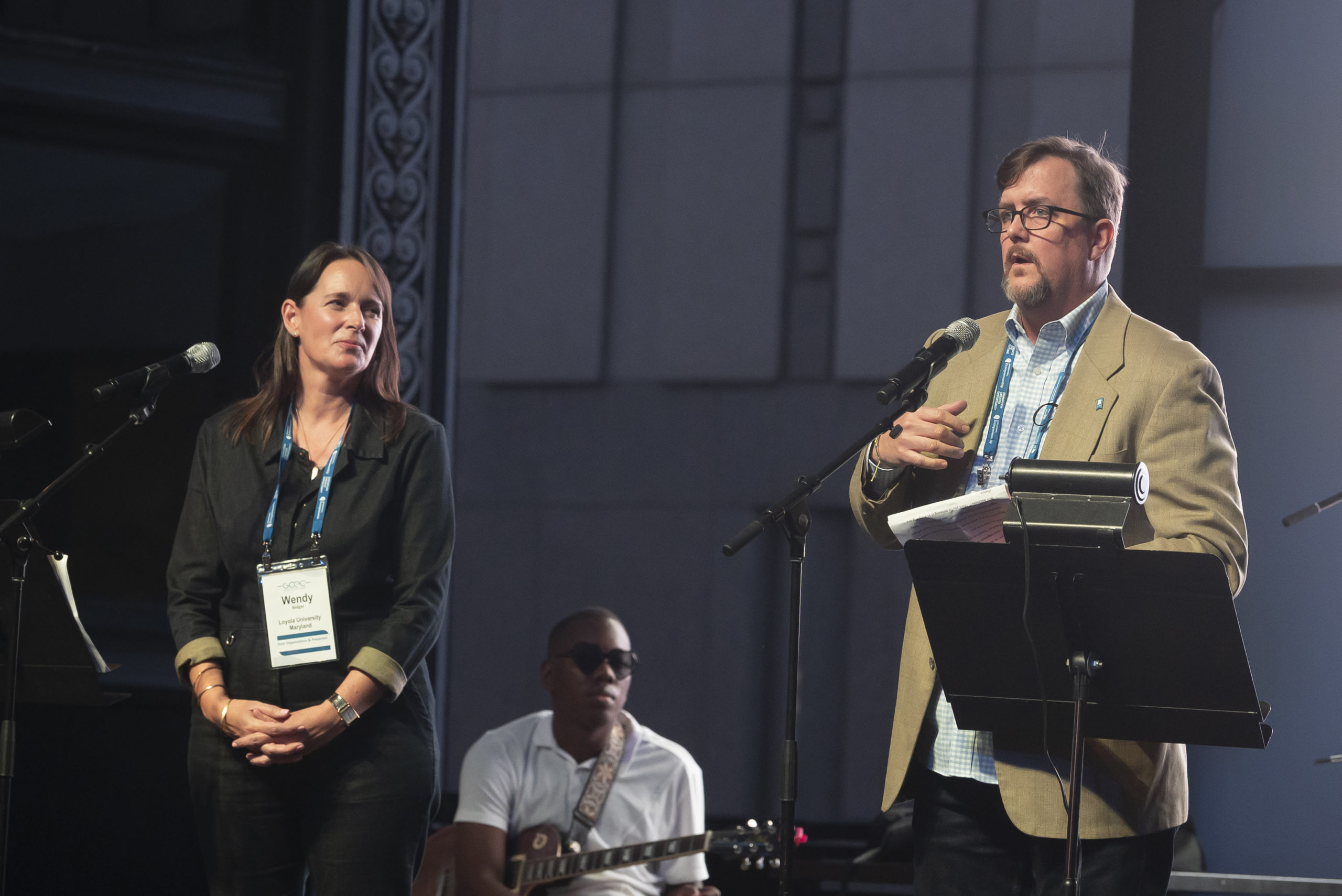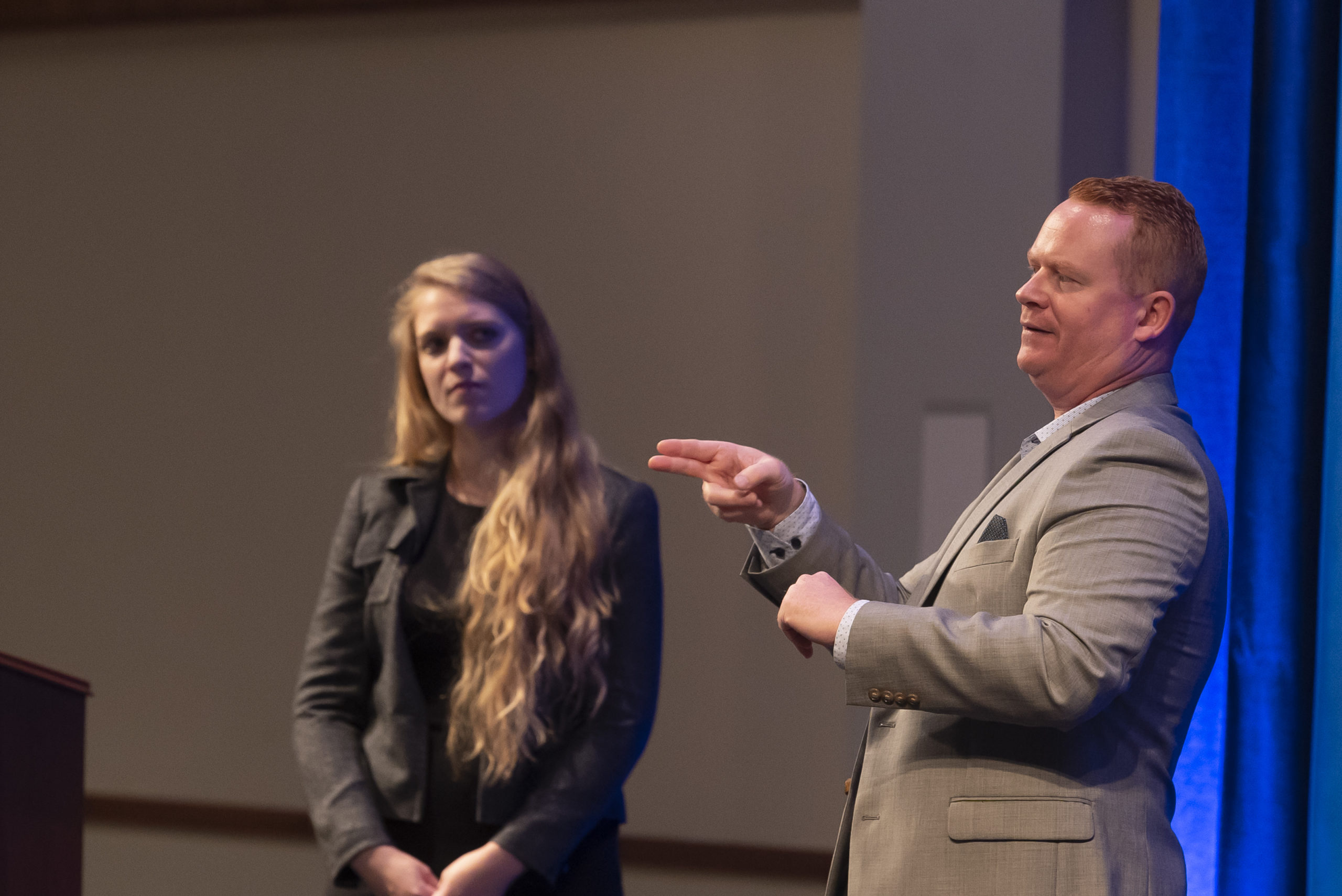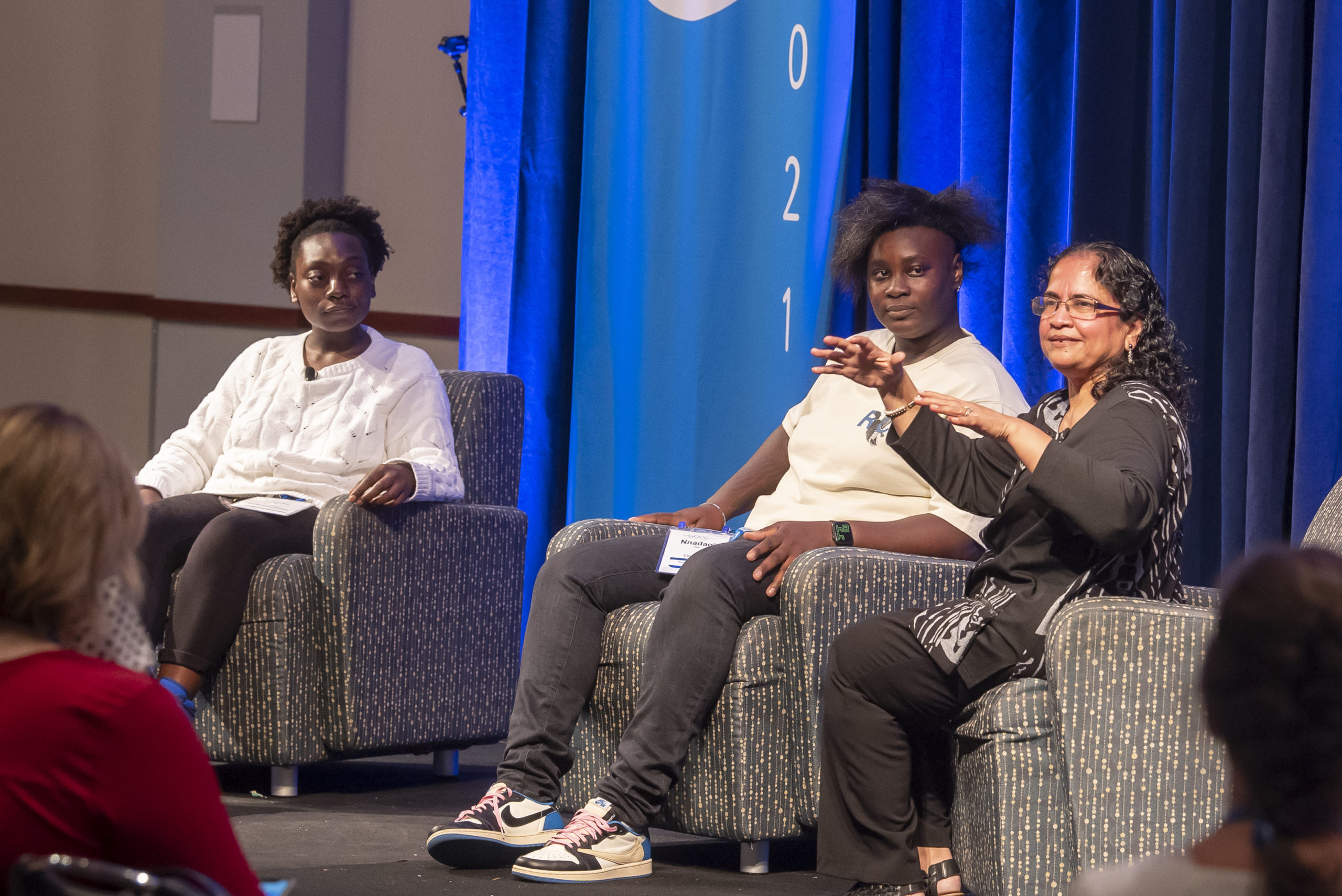Looking for the bridge between universities and cities? Look to growing businesses.
The connection was on view in October, when leaders of university entrepreneurship centers from around the country filed into Johns Hopkins’ FastForward U innovation space in Remington to talk community.
When it comes to universities and economic development, the conversation historically has been one of attracting students who will one day become residents that choose to call the city home. In Baltimore, a new generation of university leaders are adding another element: supporting the city’s future by boosting new ventures by residents who are already here.
In a brightly colored room with sleek furniture and big windows overlooking 29th Street on the October night, attendees heard from Johns Hopkins Tech Ventures Director of Student Ventures Josh Ambrose about the programming and resources offered to students starting companies. Then, Social Innovation Lab Director Madison Marks talked about the accelerator for social impact-centered ventures that’s available both to those from the university community, and Baltimoreans.
Across town in East Baltimore, at Monument City Brewing Company, ETC (Emerging Technology Center) Director Deb Tillett held court with another assembled group, talking about how the Baltimore City-backed incubator became an anchor in a development that now includes a restaurant, the brewery and additional space for companies. She was joined by Henry Mortimer, the director of the University of Baltimore Center for Entrepreneurship and Innovation, who is working with students that are largely from Baltimore, and starting businesses in the city, too.
“If they’re running a business, we want to make sure that they’re prepared to take that business and be successful in their community because that drives economic revitalization,” Mortimer told Technical.ly in an interview after the event.
Increasingly, resources formed inside institutions are built with growing Baltimore in mind.
The events, which were just a couple of a series that took place Oct. 13 to 16, drew a link that has been growing stronger in recent years: The region’s universities are a key part of the ecosystem that’s boosting entrepreneurship throughout Baltimore.
Increasingly, resources formed inside institutions are built with growing Baltimore in mind. Members of the local tech community have long noted the accelerators run by universities that welcome entrepreneurs from throughout the city, or universities that open up their innovation hubs to companies beyond their own student and faculty base, or each time a successful entrepreneur or investor serves as a mentor in a university-backed pitch competition.
In this case, however, it was on view for a wide audience. The events this fall were part of the Global Consortium of Entrepreneurship Centers’ annual conference. Drawing more than 300 attendees to the city and another 200 virtually, the conference gave Baltimore a platform to show the connective work happening here to others who run university entrepreneurship centers.
The Baltimore entrepreneurial community is one where Wendy Bolger has found support since starting as the founding director of Loyola University Maryland’s Center for Innovation and Entrepreneurship in 2018. With programs like an accelerator called Baltipreneurs that supports ventures from both the university community and the city, Bolger has grown programming within the university while also growing a network beyond the North Baltimore campus. She and Mortimer were lead co-organizers of the GCEC event in Baltimore; in doing so, they wanted to showcase the community in Baltimore where they’ve grown.
“If you do the work, then this ecosystem in Baltimore will welcome you in,” she said.

Loyola University Maryland’s Wendy Bolger and University of Baltimore’s Henry Mortimer (Courtesy photo by Larry Canner Photography)
Working at the intersection of cities and universities, the entrepreneurship center leaders gathered serve as a key conduit between institutions and the local community. While some might have a tech transfer office to spin startups out of discoveries made at a university, others are supporting business owners solving a problem in their neighborhood. They might be working with youth and veterans. There’s a common mission, but strategies can vary.
“There are a lot of us who are working very deeply in our communities,” Bolger said. “We consider it part of our job to share resources in the cities where they are working.”
During the keynote speeches at the conference, a few truths came through about entrepreneurs. For one, universities can be a launching point.
Take Allysa Dittmar. She sought to solve a problem with a new product after an ASL interpreter did not show up before a surgical procedure, making communication difficult for Dittmar, who is deaf. Dittmar cofounded ClearMask with a team of Johns Hopkins students and alums to create a transparent surgical mask to assist deaf and hard of hearing patients, and soon found the clearer communication it aided could help patients from many communities.
For Dittmar, one night in 2018 will live on in as a milestone: The company won funding at showcase nights at Johns Hopkins’ Social Innovation Lab in Baltimore, and Gallaudet University in DC. It was an encouraging moment that prepared it for 2020, when the company saw demand soar for its masks amid the pandemic. The product has since gone on to earn FDA clearance and a CE Mark.
“Between Johns Hopkins and Gallaudet, they really were the spark that made ClearMask possible,” Dittmar said.

ClearMask cofounder Allysa Dittmar and Mozzeria CEO Ryan Maliszewski. (Courtesy photo by Larry Canner Photography)
She was speaking alongside Ryan Maliszewski, who served as director of the Gallaudet Innovation & Entrepreneurship Institute before making the leap to CEO of Mozzeria, a Neapolitan pizzeria in DC that is run entirely by deaf and hard of hearing workers. After taking the helm at the onset of the pandemic, he brought technology, introducing a cycle of product launches familiar to many startups.
In Baltimore, a bamboo toilet paper company was starting around the same time. For Nnadagi Isa and Louise Isa, Lor Tush began with an idea for a product that they’d want to use, and an environmentally oriented mission. The sisters found early customers at Hotel Revival in Mount Vernon and Vero Beach Hotel in Florida. Marketing ingenuity like their slogan — “Wipe on Playa” — and a claw machine at Union Brewing filled with rolls of toilet paper helped word to spread.
“We’re an industry that hasn’t really been disrupted yet, so there’s a lot of room to play and challenge the limits to see what we can create,” Nnadagi Isa said during a keynote.

Lor Tush cofounders Nnadagi Isa and Louise Isa, with Saras Sarasvathy of UVA’s Darden School. (Courtesy photo by Larry Canner Photography)
In moderating the conversation, the examples of innovation to pull out were numerous Saras Sarasvathy, the Paul M. Hammaker Professor in Business Administration at the University of Virginia’s Darden School of Business and a leading entrepreneurship scholar in the area of effectuation.
“We may be looking at a new kind of entrepreneurship that is actually beginning to be built,” she said.
And the products entrepreneurs are harnessing can be applied to solve systemic challenges. Marcus Bullock sought to provide opportunity after encountering the disparities present in “the box” following a prison term, as he founded a painting business that employed returning citizens. He then went on to start Flikshop, a tech company which allows family members to send photos from a smartphone to loved ones who are incarcerated. It has connected 170,000 families, and he’s looking to keep growing the work toward a mission.

Flikshop CEO Marcus Bullock. (Courtesy photo by Larry Canner Photography)
“One of my personal goals is to be able to figure out how to leverage tech, data and real systems to be able to completely reduce recidivism,” he said. Currently, he said, 76% of returning citizens return to prison within five years. “We want to figure out a way to completely annihilate that number.”
Along with supporting ventures that are seeking to bring societal change, universities can bring change to how entrepreneurs are supported.
“The truth is that the last great untapped economic force in America is hiding in plain sight, and so are the institutions that are best positioned to propel it,” said Philip Gaskin, the VP of entrepreneurship at the Ewing Marion Kauffman Foundation.
In a keynote, Gaskin told the center directors that university entrepreneurship centers are in the best position to convene conversations beyond campus, to connect local employers and “train a new generation of entrepreneurs to meet the changing needs of the local economy.”
“I want you to see yourself as the vital center of an entrepreneurial ecosystem across your entire community,” he said.
###
Successful businesses can come from all universities. As Towson University Executive Director of Entrepreneurship Patrick McQuown put it to us recently: “Entrepreneurship is one of the last meritocracies we have left,” he said. There are zero requirements of a degree to start a venture.
“It matters what you do and not where you went to school,” he said.
At the university’s StarTUp program, which he directs, there are no requirements to be affiliated with the school, and the university also opened a space where the program is headquartered within downtown Towson’s former armory building that welcomes all comers.
So, in order to get a full picture of the ecosystem, it’s worth looking at the schools across Baltimore that have created entrepreneurship centers to support business growth in their communities. Each has a different way of putting its mission into practice and is a different size, but all support those who are looking to build businesses. Here’s a look at the university entrepreneurship centers and supporters in Baltimore:
- University of Baltimore Center for Entrepreneurship and Innovation
- Loyola University Maryland Center for Innovation and Entrepreneurship
- Johns Hopkins Tech Ventures: FastForward
- Johns Hopkins Social Innovation Lab
- The GRID: University of Maryland, Baltimore
- University of Maryland BioPark
- Harbor Launch at Institute of Marine and Envrionmental Technology
- University System of Maryland/Maryland Momentum Fund
- bwtech@UBMC
- StarTUp at Towson University
- Ratcliffe Center for Creative Entrepreneurship at MICA
- Coppin State University Center for Strategic Entrepreneurship
- Morgan State Entrepreneurial Development and Assistance Center
- McDaniel College program in Innovation and Entrepreneurship
- Salisbury University Rommel Center for Entrepreneurship + Innovation, Entrepreneurship and Economic Development Hub
- Startup UMD
- Bowie State Entrepreneurship Living Learning Community
- Community College of Baltimore County Center for Business Innovation
- Anne Arundel Community College Entrepreneurial Studies Institute
- Universities at Shady Grove Lab for Entrepreneurship and Transformative Leadership
- UMES Center for Entrepreneurship and Innovation
- Frostburg State University
- Carroll College Entrepreneurship Program
- Montgomery College
- Hood College
Before you go...
Please consider supporting Technical.ly to keep our independent journalism strong. Unlike most business-focused media outlets, we don’t have a paywall. Instead, we count on your personal and organizational support.
Join our growing Slack community
Join 5,000 tech professionals and entrepreneurs in our community Slack today!

The person charged in the UnitedHealthcare CEO shooting had a ton of tech connections

From rejection to innovation: How I built a tool to beat AI hiring algorithms at their own game

Where are the country’s most vibrant tech and startup communities?


